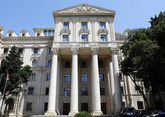The next Eastern Partnership Summit will take place in Brussels on November 24 - the EU integration program, which has been working since 2009, aimed at strengthening ties with Armenia, Azerbaijan, Belarus, Georgia, Moldova and Ukraine.
Initiated in by Poland and Sweden, the Eastern Partnership have repeatedly been declared a "dead" project by a number of experts in recent years. Indeed, after the failure of the Vilnius summit in 2013, it seemed that the project has reached a deadlock due to geopolitical competition from Russia. Then, two of its participants (Armenia and Ukraine), under different pretexts, at the last moment refused to sign an EU association agreement. Azerbaijan informed the European partners in advance that it is not interested in the proposed format of the association with the EU, and for Belarus this issue was not on the agenda in principle. As a result, in 2013 the association agreement was signed by Moldova and Georgia. The Vilnius summit became the trigger mechanism that launched the Euromaidan in Ukraine, which signed an associative agreement after a violent change of power, but lost control of Crimea and Donbass.

The situation did not clear up at the Riga Eastern Partnership summit in 2015 as well. Then the observers emphasized that the EU did not agree to liberalize the visa regime with Georgia and Ukraine, which chose the pro-Western way, which was seriously expected in Tbilisi and Kiev. By the way, Moldova had already received visa-free access to Europe, but Chisinau was in a slightly different situation: a significant part of the population already has Romanian passports, which Brussels also understood and did not fear that the decision to liberalize the visa regime would cause a sharp increase flow of illegal migrants. Armenia and Azerbaijan were in the "waiting mode" at the Riga summit, as there was no clear agenda for these countries.
At the same time, as subsequent events showed, the significance of the summit in Riga turned out to be central for the further development of the Eastern Partnership. And it's not that the citizens of Ukraine and Georgia still got the right to visit the European Union without visas. (At the moment, the EU is introducing alternative restrictions for Ukrainian and Georgian citizens, but these measures are aimed at suppressing illegal migration and are hardly offset by the positive political effect of liberalization of the visa regime for the governments of the two countries). More importantly, in 2015, the foundation was laid for individualizing the approaches of the European Union to different members of the Eastern Partnership. It is obvious that Brussels made conclusions from the negative experience received in 2013 and decided to offer each of the partners a package of agreements that would take into account each country's domestic and foreign policy factors more closely, and at the same time would allow the European Union to increase its influence there.
It seems that this turn in the Eastern Partnership policy could bring first results in the South Caucasus in the near future. Both Armenia and Azerbaijan plan to sign new agreements with the EU. The negotiations between Baku and Brussels have not yet been completed, and it is not yet clear how successful their completion will be. Armenia's situation is more definite.

In February this year, Armenian President Serzh Sargsyan and Chairman of the European Council Donald Tusk announced the completion of work on the EU-Armenia comprehensive and enhanced partnership agreement. It is not known exactly when the agreement will be signed, but it will happen in the near future. Another question is how and to what extent it will be implemented by the Armenian authorities. For example, within the framework of the agreement, Armenia undertakes to start a fight against monopolies, although oligarchs-monopolists are the backbone of the Armenian government. They are the ones who provide "pre-election bribes" to Armenian voters. It is hard to believe that the authorities will diligently bite the hand that feeds them.
Europeans, in turn, also understand Armenia's economic and political realities - the European embassies and the Western funds operating in the country, as well as the local NGOs funded by them, provide quite detailed information about the country. But Brussels is ready to work diligently with the Armenian society at all the levels - not only with young people, human rights activists and the media, but also with the pro-government business elite and oligarchs. Europe has something to offer them - starting from cheap loans to new export opportunities. And for"simple people" Brussels can always provide a facilitated visa regime, scholarships for students, the opportunity to enter the EU for seasonal or permanent job - Europe has enough mechanisms to economically "eat up" the population and the elite of such a small and poor country. Especially on the background of Russia's economic problems, because of which the volume of remittances of Armenians living and working in Russia to their homeland has significantly decreased. If before the devaluation of the ruble Russia's share in the total volume of private transfers to Armenia was 80%, then in 2016 it declined to 58.5%.
The long-term strategy of the EU is to consistently reorient the Armenian economy to Europe in order to increase its own political influence in this country. Obviously, the Europeans are not interested in the Armenian market, which is insignificant for the scale of the European economy. Also, there is no acute need for Armenian products on the intra-European market, which is saturated with high-quality competitive goods. There is a tangible geopolitical background in the EU's desire to modernize Armenia and its economy (which is the purpose of the draft agreement). According to Armenia's official statistical data for the first half of 2017, about 30% of the country's exports account for the EU countries, and only 22% - for the EEU. With the increase in the share of the EU among Armenia's export destinations, its political weight will inevitably increase as well.
This also explains the rather restrained position of the European Union in the Armenian-Azerbaijani Nagorno-Karabakh conflict. Baku has repeatedly expressed dissatisfaction with the various approaches of the EU on the issues of Abkhazia, South Ossetia, Crimea and Nagorno-Karabakh. If in the first three cases the European Union speaks exclusively about the need to restore the sovereignty and territorial integrity of Georgia and Ukraine, in the case of Nagorno-Karabakh the position of Europeans is more blurred and equidistant. The reason is that Europe (or, more broadly, the West) seeks to include, sooner or later, the entire South Caucasus in a zone of its political and economic influence. They already did it with Georgia, while Armenia and Azerbaijan are considered in one bundle. For this reason, Armenia and Azerbaijan were simultaneously admitted to the Council of Europe. For the same reason, Brussels will not give definitive preference to any of the parties to the conflict. However, the European Union is not the only geopolitical center that adheres to such a policy in the region.










